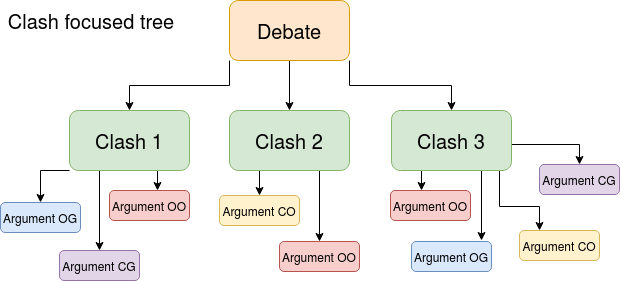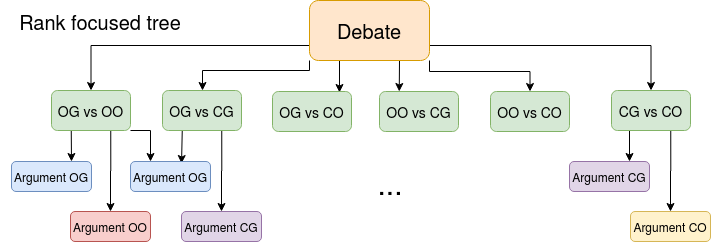What is this post about?
At Thailand WUDC 2020 Sella Nevo gave a workshop on efficient adjudication. Even though the workshop was only 30 minutes long it was one of the best summaries of the practical aspects of adjudication I have ever seen. If somebody had given that workshop to me four years ago, a lot of my adjudications would have been a lot more accurate and less messy. In this post, I merely want to distill the basic ideas and illustrate them. All credit goes to Sella Nevo.
Note-taking
We are unable to remember everything that has been said in an entire debate and therefore have to take notes. However, there are better and worse ways to do that. I think the basic framing that we should adopt is that the notes should prepare you as well as possible for the discussion. Since the debate takes 60 minutes and the discussion only 15 there has to be a lot of compression of information.
-
Don’t write down everything: It is tempting to try to write down everything a speaker says - after all, we don’t want to miss anything, right? However, this precision often comes at the cost of understanding. I would, therefore, recommend focusing on the gist of what a speaker is saying and summarize drastically by focusing on the logic of the speech. A thirty-second argument can often be summarized in one line, e.g. “legal drugs -> more regulation -> better product -> less overdose”. Sella even went as far as suggesting that using your laptop for notes might be a disadvantage because you can write so fast that you don’t compress information sufficiently.
-
Use shortcut-symbols: There are tons of concepts that we use in nearly every debate. Most of the time something increases or decreases, there is rebuttal, A leads to B, etc. Shortcuts save time. You can make up your own, but here are some that I use or have seen used by others

-
Be meta: Your notes should include some meta-commentary. That could be along the lines of “I didn’t understand this argument”, “This argument missed the comparative”, “Not responsive” or “discuss with the panel”. This is work you should already do during the debate since you can start discussing earlier. Some people color code their commentary, some have extra columns on their sheets - I personally have a separate sheet dedicated to meta-commentary and summary.
-
Rank during the debate: Whenever speakers prepare for their speech there is around a minute of nothing really happening. Instead of just waiting you should use that time to already think about your current impression of the debate. These are obviously not final and you should reconsider them once the debate has actually finished. You could, for example, after the DLO finished their speech, write “OG wins opening have because OO was not responsive to OG” or just more generally think about the contribution of the speaker, e.g. “OG convinced me that this effect is very likely true but didn’t show its size”. This again saves time. If we assume that you have on average an effective 5 minutes of breaks aggregated over all speeches this means that you have already freed up a third of the actual discussion.
Overall, keep in mind that notes are a way for you to recap the debate with quick access. Nobody else has to understand them as long as you do. But make sure that you understand them. If you do not understand a speaker don’t just write down a concatenation of the buzzwords you hear but lean back and try to actually understand the argument. If you still don’t understand, note that and discuss it with the panel.
Discussion: as chair
It is, once more, important to stress that 15 minutes is not a lot of time to adjudicate debates. Therefore time and clarity are key.
- Focus on the controversial stuff: You can represent a debate as a tree structure. The entire debate is the root, the branches are either clashes or rankings between teams and the leaves are the arguments the teams made. At the beginning of your discussion, you need to find out what parts of the tree are controversial and which are not. The rest of the discussion is then spent on deciding the controversial parts of the tree. Uncontroversial parts of the tree should be mostly ignored during the discussion since they don’t yield any new insight. They are obviously still relevant for the ranking.


-
Be explicit: Everyone in your panel needs to understand what you are currently trying to achieve. Spending ten seconds on clarifying which clash you want to solve can save one minute of rambling. An example would be “Let’s discuss the opening half first, OG said X, OO said Y, Wing Z you are the only one to think OG beats OO. Why is this the case? Try to keep it short and comparative.” (or some more normal version of that).
-
Be decisive but not unfriendly: Communication is hard, we might be nervous, inexperienced or just like to talk. Since time is limited it is often necessary to stop someone and refocus the discussion even if that feels rude. Even though there is a fine line between being decisive and rude, I think one should prioritize having an effective discussion over courtesy. After all, we want to get the best possible result for the teams.
Discussion: as wing
The overall goal as a wing should be to help out with the discussion whenever possible. That includes answering questions of the chair, clarifying misunderstandings, etc.
-
Focus on progress - don’t try to shine: Debating is a game that selects to some degree for self-portrayal. Combine this with the fact that most of us want to break often leads to situations in which we not only answer the question asked by the chair but additionally talk about a different clash and use fancy debate words to impress the rest of the panel. However, the chair might have a different plan and most of our effort is wasted. My recommendation: answer only the question that was asked. If you didn’t understand it just ask for clarification. A chair will usually much prefer a concise but focused over a lengthy but unfocused answer. Your chances of breaking are not correlated to the number of minutes you talk during a discussion.
-
Pick your part: Of the 15 minutes we have for the adjudication around 12 are used for discussion and the rest is used for speaks and silent recap. Since there are three adjudicators in most rounds and the chair usually talks more than the wings, you have around 2-3 minutes to contribute per discussion as a wing. Think about the two things that you want to convince the rest of the panel after seeing their initial calls. You might, for example, be the only one who thinks that CG beats CO. At some point in the discussion, the chair will likely ask why you think that is the case and you should be ready to justify it. Especially when you are still inexperienced and you can’t keep up with the speed of the discussion this is a good way for you to contribute meaningfully.
TL;DR: Adjudication has a very limited amount of time and communication is generally hard. It is therefore important to be fast and explicit. Adjudication should already be prepared during the debate by smart notetaking. During the discussion, it is important to be concise and focus on progress.
I would like to thank Dominik Hermle for feedback and suggestions.
One last note
If you want to get informed about new posts you can subscribe to my mailing list or follow me on Twitter.
If you have any feedback regarding anything (i.e. layout or opinions) please tell me in a constructive manner via your preferred means of communication.